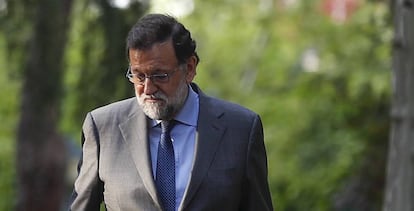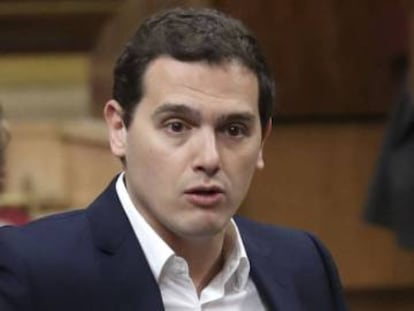Spanish PM Rajoy on the ropes as corruption scandals hit ruling party
Graft cases leave leader unable to capitalize on economic growth and weakness of other parties

The arrest on Wednesday of a former premier of the region of Madrid, and a court’s decision to make Prime Minister Mariano Rajoy take the witness stand at the Gürtel graft trial, have seriously hurt the Spanish PM’s attempt to relaunch his party’s image during his new term in office. A recovering economy, a weak opposition and an unstable international scenario should all have provided a good opportunity for the Popular Party (PP) leader to present himself as a solid political reference point. Instead, a resurgence of corruption cases is ruining that opportunity.

After a 10-month stalemate, two national elections and a reinstatement made possible only by the Socialist Party’s controversial decision not to block Rajoy’s bid to once again become prime minister at a congressional vote last year, the PM has been using Spain’s economic progress as proof that his first-term reforms worked, and he is asking the opposition for support to get crucial legislation passed.
When corruption cases get complicated Rajoy lets his lieutenants deal with the mess
Rajoy was hoping to have left behind the wave of scandals that played such a big role in making way for the rise of newcomers like the anti-austerity Podemos party and the reform-minded Ciudadanos party to Spain’s political scene. But these hopes were dashed this week by a court summons for Rajoy to testify as a witness over Gürtel, a massive bribes-for-contracts scheme whose investigation alone took almost a decade, and by the arrest of former Madrid regional leader Ignacio González in a case that could potentially open up a whole new can of worms for the Madrid PP. And earlier this month, the PP premier of the Murcia region stepped down after becoming the target of a separate corruption investigation.
The PM’s reaction has been to return to his “cave” at La Moncloa, the seat of government, and emerge only for international trips (he will visit Uruguay, Brazil, Brussels and China in the next three weeks) and for highly institutionalized, risk-free events such as the 25th anniversary celebration of the AVE high-speed train from Madrid to Seville, scheduled for Friday.

Rajoy does not offer press conferences, and barely takes mandatory questions, which he answers with perfunctory remarks.
To the outside world, Rajoy still presents an image of stability thanks to higher-than-expected economic growth, good job creation prospects, a fighting chance of finally meeting European Union deficit targets, and palpable progress on the 2017 budget proposal. Meanwhile, France, Britain and Germany are facing elections with uncertain outcomes.
But back home, corruption continues to put a damper on the PP’s plans to clean up its image. And when the Murcia, Gürtel or Púnica cases get complicated, Rajoy hangs back and sends his lieutenants to deal with the mess instead.
Ciudadanos leader Albert Rivera summed up the opposition’s feeling on Wednesday, when he told the Efe news agency that “this is undeniably not good for Spain.”
A resurgence of corruption cases is ruining Rajoy’s chance to clean up his image
But the PP spokesman in Congress, Rafael Hernando, denies that the latest corruption scandals are hurting the government.
“The image of Spain and of the prime minister are safe,” he said. “The government is doing what it has to do: working to get families out of the crisis, and legislating, which are the important things; others spend their time making things complicated and discrediting the prime minister.”
English version by Susana Urra.
Tu suscripción se está usando en otro dispositivo
¿Quieres añadir otro usuario a tu suscripción?
Si continúas leyendo en este dispositivo, no se podrá leer en el otro.
FlechaTu suscripción se está usando en otro dispositivo y solo puedes acceder a EL PAÍS desde un dispositivo a la vez.
Si quieres compartir tu cuenta, cambia tu suscripción a la modalidad Premium, así podrás añadir otro usuario. Cada uno accederá con su propia cuenta de email, lo que os permitirá personalizar vuestra experiencia en EL PAÍS.
¿Tienes una suscripción de empresa? Accede aquí para contratar más cuentas.
En el caso de no saber quién está usando tu cuenta, te recomendamos cambiar tu contraseña aquí.
Si decides continuar compartiendo tu cuenta, este mensaje se mostrará en tu dispositivo y en el de la otra persona que está usando tu cuenta de forma indefinida, afectando a tu experiencia de lectura. Puedes consultar aquí los términos y condiciones de la suscripción digital.








































